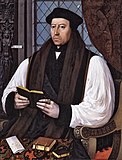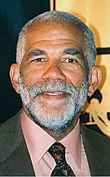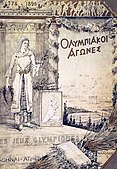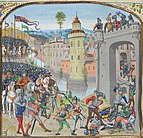Wikipedia:Today's featured article/July 2024
| << | Today's featured articles for July 2024 | >> | ||||
|---|---|---|---|---|---|---|
| Su | Mo | Tu | We | Th | Fr | Sa |
| 1 | 2 | 3 | 4 | 5 | 6 | |
| 7 | 8 | 9 | 10 | 11 | 12 | 13 |
| 14 | 15 | 16 | 17 | 18 | 19 | 20 |
| 21 | 22 | 23 | 24 | 25 | 26 | 27 |
| 28 | 29 | 30 | 31 | |||
July 1
The Flag of Canada is a red flag with a white square in its centre, featuring a stylized 11-pointed red maple leaf. It has become the predominant and most recognizable national symbol of Canada. It was adopted in 1965 to replace the Union Flag for most official purposes, although the Canadian Red Ensign had also been unofficially used since the 1860s and approved by a 1945 Order in Council. In 1964, Prime Minister Lester B. Pearson appointed a committee to resolve the issue, sparking a serious debate about a flag change. Out of three choices, the maple leaf design by George Stanley, based on the flag of the Royal Military College of Canada, was chosen. It made its first appearance on February 15, 1965, a date now celebrated annually as National Flag of Canada Day. Other flags, usually containing the maple leaf motif in some fashion, have been created for use by Canadian officials, government bodies, and military forces. (Full article...)
July 2
Thomas Cranmer (2 July 1489 – 21 March 1556) was a leader of the English Reformation and an Archbishop of Canterbury. He helped build the case for the annulment of Henry VIII's marriage to Catherine of Aragon, which contributed to the separation of the English Church from the Holy See. He established the first doctrinal and liturgical structures of the Church of England and published the Exhortation and Litany. When Edward VI was king, Cranmer published the Book of Common Prayer, changed doctrine or discipline in several areas, and promulgated the new doctrines through the Homilies. Upon the accession Mary I, Cranmer was put on trial for treason and heresy. While imprisoned he made several recantations and reconciled himself with the Catholic Church. Mary pushed for his execution, and he was burned at the stake after withdrawing his recantations. Cranmer's death was immortalised in Foxe's Book of Martyrs and his legacy continues through the Book of Common Prayer and the Thirty-Nine Articles. (Full article...)
July 3

On Her Majesty's Secret Service is the tenth novel and eleventh book in Ian Fleming's James Bond series. First published in 1963, the novel centres on Bond's search to find Ernst Stavro Blofeld after the events depicted in Thunderball (1961). Bond falls in love with Tracy di Vicenzo during the story. The pair marry, but hours afterwards, Blofeld and his partner, Irma Bunt, attack them, killing Tracy. Fleming developed Bond's character within the book, showing an emotional side that was not previously present. The novel is one of three Bond stories to deal with the disruption of markets and the economy, in this case Blofeld's planned disruption to the food supply by bioterrorism. The novel received broadly positive reviews. In 1969 it was adapted as the sixth film in the Eon Productions James Bond film series and was the only film to star George Lazenby as Bond. (This article is part of a featured topic: Ian Fleming's James Bond novels and short stories.)
July 4
| blurb to come |
The Statue of Liberty is a colossal neoclassical sculpture on Liberty Island in New York Harbor, within New York City. The copper statue, a gift to the U.S. from the people of France, was designed by French sculptor Frédéric Auguste Bartholdi and its metal framework was built by Gustave Eiffel. The statue was dedicated on October 28, 1886. (Full article...)
July 5
Ed Bradley (1941–2006) was an American broadcast journalist best known for reporting with 60 Minutes and CBS News. Bradley started his television news career in 1971 as a stringer for CBS at the Paris Peace Accords. He won Alfred I. duPont and George Polk awards for his coverage of the Vietnam War and the Cambodian Civil War. Returning to the United States, he became CBS's first Black White House correspondent. Bradley joined 60 Minutes in 1981 and reported on more than 500 stories with the program during his career, the most of any of his colleagues. Known for his fashion sense and disarming demeanor, Bradley's reporting won numerous journalism awards and been credited with prompting federal investigations into psychiatric hospitals, lowering the cost of drugs used to treat HIV/AIDS, and ensuring that the accused in the Duke lacrosse case received a fair trial. He died of lymphocytic leukemia in 2006. (Full article...)
July 6
"Wildest Dreams" is a song by the American singer-songwriter Taylor Swift; it is the fifth single from her fifth studio album, 1989 (2014). She wrote the synth-pop, dream pop, and electropop song with its producers Max Martin and Shellback. The lyrics feature Swift pleading with a lover to remember her even after their relationship ends. Retrospectively, critics have described "Wildest Dreams" one of Swift's most memorable songs. The single peaked within the top five on charts of Australia, Canada, Poland, South Africa, and also the United States, where it became 1989's fifth consecutive top-ten single on the Billboard Hot 100. The track was certified four-times platinum. The music video depicts Swift as a classical Hollywood actress who falls in love with her co-star; media publications praised the production as cinematic but accused the video of glorifying colonialism. (This article is part of a featured topic: 1989 (album).)
July 7
Tales of Monkey Island is a graphic adventure video game developed by Telltale Games under license from LucasArts. It is the fifth game in the Monkey Island series, released a decade after the previous installment. The game was released in five episodic segments between July and December 2009. Players assume the role of Guybrush Threepwood who releases a voodoo pox and seeks a cure. The game was conceived in late 2008 due to renewed interest in adventure game development within LucasArts. Production began in early 2009, led by Dave Grossman (pictured). It received generally positive reviews, with praise for the game's story, writing, humor, voice acting and characterization. Complaints focused on the quality of the game's puzzle design, a weak supporting cast in the early chapters, and the game's control system. Tales of Monkey Island garnered several industry awards and was Telltale's most commercially successful project until Back to the Future: The Game. (Full article...)
July 8
RoboCop is a 1987 American science fiction action film directed by Paul Verhoeven and written by Edward Neumeier and Michael Miner. Set in a crime-ridden Detroit in the near future, it centers on police officer Alex Murphy (Peter Weller), who is murdered by a gang of criminals and revived by the megacorporation Omni Consumer Products as a cyborg. The director emphasized violence throughout the film, making it so outlandish that it became comical. RoboCop was a financial success upon its release in July 1987, earning $53.4 million. Reviewers praised it as a clever action film with deeper philosophical messages and satire, but were conflicted about the violence. The film won an Academy Award for sound editing. RoboCop has been critically reevaluated since its release and hailed as one of the best films of the 1980s for its depiction of a cyborg coming to terms with the lingering fragments of its humanity. (Full article...)
July 9
The oceanic whitetip shark is a large requiem shark inhabiting tropical and warm temperate seas. It has a stocky body with long, white-tipped, rounded fins. The species is typically solitary but can congregate around food concentrations. It is found worldwide between 45°N and 43°S latitude in deep, open oceans. Bony fish and cephalopods are the main components of its diet. Females give live birth after a gestation period of nine to twelve months. Though slow-moving, it is opportunistic, aggressive, and reputed to be dangerous to shipwreck survivors. The shark was once extremely common and widely distributed; up to the 16th century, mariners noted that this species was the most common ship-following shark. The species has now been listed as critically endangered, and recent studies show steeply declining populations worldwide as the sharks are harvested for their fins and meat, like many other shark species. (Full article...)
July 10
DeLancey W. Gill (1859–1940) was an American drafter, landscape painter, and photographer. As a teenager, he moved in with an aunt in Washington, D.C., after his mother and stepfather travelled west. He eventually found himself employed as an architectural draftsman for the Treasury. He created sketches and watercolor paintings of the city, with a particular focus on the still-undeveloped rural and poorer areas of the district. While working as an illustrator for the Smithsonian's Bureau of American Ethnology in the 1890s, he was appointed as the agency's photographer without prior photographic training. He took portrait photographs that circulated widely of thousands of Native American delegates to Washington, including notable figures such as Chief Joseph and Geronimo. These photographs have come under modern criticism for his frequent use of props and clothing given to the delegates, at times outdated or from a different tribe. (Full article...)
July 11

Still Reigning is a live performance DVD by the thrash metal band Slayer, released in 2004 through American Recordings. Filmed at the Augusta Civic Center on July 11, 2004, the performance showcases Slayer's 1986 album, Reign in Blood, which was Slayer's first album to enter the Billboard 200. The album was played in its entirety with the four original band members on a set resembling their 1986 "Reign in Pain" tour. Still Reigning was voted "best live DVD" by the readers of Revolver magazine, and received gold certification in 2005. In the finale, the band is covered in stage blood while performing the song "Raining Blood". The mixing process was demanding, plagued by production and technical difficulties; the DVD's producer Kevin Shirley spent hours replacing cymbal and drum hits one-by-one. Later, Shirley publicly aired his financial disagreements with the band and criticized the quality of the recording. (Full article...)
July 12
Hypericum sechmenii (Seçmen's St John's wort) is a rare species of flowering plant in the St John's wort family that is found in Eskişehir Province in central Turkey. It was first described and assigned to the genus Hypericum in 2009, and was later placed into the section Adenosepalum. H. sechmenii is a perennial herb that grows 3–6 centimeters (1–2 inches) tall and blooms in June and July. The stems of the plant are smooth and lack hairs, while the leaves are leathery and lack leafstalks. Its flowers are arranged in corymbs, and each has five bright yellow petals. Similar species are H. huber-morathii, H. minutum, and H. thymopsis. Found among limestone rocks, H. sechmenii has an estimated distribution of less than 10 square kilometers, with fewer than 250 surviving plants. Despite containing druse crystals and toxic chemicals that may deter herbivory, the species is threatened by overgrazing, as well as climate change and habitat loss. (Full article...)
July 13

Alan Wace (13 July 1879 – 9 November 1957) was an English archaeologist who served as director of the British School at Athens between 1914 and 1923. He excavated widely in Thessaly, Laconia and Egypt and at the Bronze Age site of Mycenae in Greece. Along with Carl Blegen, Wace argued against the established scholarly view that Minoan Crete had dominated mainland Greek culture during the Bronze Age. His excavations at Mycenae in the early 1920s established a chronology for the site's domed tombs that largely proved his theory correct. Wace served as the Laurence Professor of Classical Archaeology at Cambridge University between 1934 and 1944, and ended his career at Alexandria's Farouk I University. During both world wars, he worked for the British intelligence services, including as a section head for MI6 during the Second World War. His daughter, Lisa French, also became an archaeologist and excavated at Mycenae. (Full article...)
July 14
The UEFA Euro 2004 final was the final match of Euro 2004, the 12th European Championship, organised by UEFA for the senior men's national teams of its member associations. The match was played at the Estádio da Luz in Lisbon, Portugal, and contested by Portugal and Greece. The two defences ensured that goal-scoring opportunities were limited, and the score was 0–0 at half-time. Greece scored the only goal of the match after 57 minutes when Angelos Basinas took a corner kick to Angelos Charisteas, who sent a header past goalkeeper Ricardo. Several pundits labelled Greece's tournament win the greatest upset in the history of the European Championship, with their pre-tournament bookmaker odds at 150–1. Greece subsequently failed to qualify for the 2006 FIFA World Cup and did not successfully defend their European Championship in 2008. Portugal eventually won the European Championship in 2016. (Full article...)
July 15
Jacques Offenbach (1819–1880) was a German-born French composer, cellist and impresario. He is remembered for his nearly 100 operettas of the 1850s to the 1870s, and his uncompleted opera The Tales of Hoffmann. Beginning as a cellist and conductor, Offenbach first wrote small-scale one-act pieces due to theatricial licensing laws. These eased by 1858 when he premiered his first full-length operetta, Orphée aux enfers. La belle Hélène (1864) and other successes followed. The risqué humour (often about sexual intrigue) and gentle satire in these pieces, together with his facility for melody, made them internationally known, and he was a powerful influence on later operetta and musical theatre composers. His best-known works were continually revived during the 20th century, and many of his operettas continue to be staged in the 21st. The Tales of Hoffmann remains part of the standard opera repertory. (Full article...)
July 16

The Hanford Engineer Works (HEW) was a nuclear production complex in Benton County in the US state of Washington, established in 1943 as part of the Manhattan Project during World War II. Plutonium manufactured at the HEW was used in the atomic bomb detonated in the Trinity test on 16 July 1945, and the Fat Man bomb used in the bombing of Nagasaki on 9 August 1945. DuPont was the prime contractor for its design, construction and operation. The land acquisition was one of the largest in US history. Construction commenced in March 1943, and the construction workforce reached a peak of nearly 45,000 workers in June 1944. B Reactor, the world's first full-scale plutonium production nuclear reactor, went critical in September 1944, followed by D and F reactors in December 1944 and February 1945 respectively. The HEW suffered an outage on 10 March 1945 due to a Japanese balloon bomb. The total cost of the HEW up to December 1946 was over $348 million (equivalent to $4.1 billion in 2023). (Full article...)
July 17
Cora Agnes Benneson (1851–1919) was an American attorney, lecturer, and writer. She graduated from the University of Michigan, earning a Bachelor of Arts in 1878, a Bachelor of Laws in 1880, and a Master of Arts in 1883, and was thereafter admitted to the bars of Illinois and Michigan. From 1883 to 1885, she traveled the world to learn about legal cultures and how they affected women. When she returned to the United States, she undertook a nationwide lecture tour to speak about her travels and observations. In 1886 Benneson briefly worked as an editor of West Publishing's law reports before taking up a history fellowship at Bryn Mawr College under then-professor Woodrow Wilson. In 1888 she moved to Boston, where she continued to write and lecture. She was licensed to practice law in Massachusetts in 1894 and opened a law practice. She was made a fellow of the American Association for the Advancement of Science in 1899 and elected secretary of its Social and Economic Science Section in 1900. (Full article...)
July 18
John Glenn (July 18, 1921 – December 8, 2016) was a United States Marine Corps aviator, engineer, astronaut, and politician. Before joining NASA, Glenn was a distinguished fighter pilot in World War II, the Chinese Civil War and the Korean War. In 1957, he made the first supersonic transcontinental flight across the United States. His on-board camera took the first continuous, panoramic photograph of the United States. He was one of the Mercury Seven, military test pilots selected in 1959 by NASA as the nation's first astronauts. On February 20, 1962, Glenn flew the Friendship 7 mission, becoming the first American to orbit the Earth, and the fifth person and third American in space. After retiring from NASA, he served from 1974 to 1999 as a Democratic U.S. Senator from Ohio. In 1998, Glenn flew on the Discovery space shuttle's STS-95 mission, making him the oldest person to enter Earth orbit and the only person to fly in both the Mercury and Space Shuttle programs. He received the Presidential Medal of Freedom in 2012. (Full article...)
July 19
John D. Whitney (July 19, 1850 – November 27, 1917) was an American Catholic priest and Jesuit who was the president of Georgetown University from 1898 to 1901. Born in Massachusetts, he joined the United States Navy at the age of sixteen. He became a Jesuit in 1872 and spent the next twenty-five years studying and teaching mathematics at Jesuit institutions in Canada, England, Ireland, and around the United States. He became the vice president of Spring Hill College in Alabama before becoming the president of Georgetown University. He oversaw the completion of Gaston Hall, construction of the entrances to Healy Hall, and the establishment of Georgetown University Hospital and what would become the School of Dentistry. Afterwards, Whitney became the treasurer of Boston College and then engaged in pastoral work in Philadelphia, Brooklyn, and Baltimore, where he became the prefect of St. Ignatius Church. (This article is part of a featured topic: Presidents of Georgetown University.)
July 20
The Alpine ibex (Capra ibex), also known as the steinbock, is a species of goat that lives in the Alps of Europe. Its closest living relative is the Iberian ibex. They have brownish grey coats and sharp hooves adapted to steep, rough terrain. The males are larger than the females. Found at elevations as high as 3,300 m (10,800 ft), they are active throughout the year, primarily feeding on grass in open alpine meadows. Adult males and females segregate for most of the year, coming together only during the breeding season, when males fight for access to females using their long horns. The Alpine ibex has been successfully reintroduced to parts of its historical range, but all individuals living today descend from a population bottleneck of fewer than 100 individuals from Gran Paradiso National Park in Italy. The species has few predators and is not threatened, but it has very low genetic diversity. (Full article...)
July 21
July 22
| blurb to come |

July 23

Empire of the Sultans was a 1995–2004 touring exhibition displaying objects from the Khalili Collection of Islamic Art. Around two hundred exhibits, including calligraphy, textiles, pottery, weapons, and metalwork, illustrated the art and daily life of six centuries of the Ottoman Empire. Many of the objects had been created for the leaders of the empire, the sultans. Two of the calligraphic pieces were the work of sultans themselves. In the 1990s, the exhibition was hosted by institutions in Switzerland, the United Kingdom, and Israel, and its first catalogue was published by J. M. Rogers. The exhibits visited thirteen cities in the United States from 2000 to 2004, despite controversies in the wake of the September 11 attacks and the Iraq War. Critics described the exhibition as wide-ranging and informative. They praised it for showing beautiful art works – naming the calligraphy in particular – and for presenting a fresh view of Islam. (Full article...)
July 24
Ty Cobb was suspended for ten days during the 1912 baseball season. Cobb was disciplined for beating Claude Lucker, a fan who had been heckling him during the four-game series between Cobb's Detroit Tigers and the New York Yankees. Cobb was ejected from the game on May 15, 1912, and American League president Ban Johnson suspended him indefinitely. Cobb's teammates took his side, and after beating the Philadelphia Athletics on May 17, told Johnson that they would not play again until Cobb was reinstated. Johnson refused to do so. Seeking to avoid a $5,000 fine, owner Frank Navin told manager Hughie Jennings to recruit a team; he did so. Facing the Athletics, baseball's World Champions, the replacement players, joined by Jennings and his coaches, lost 24–2, after which Cobb persuaded his teammates to return. They were fined, as was Cobb when reinstated on May 25, but Navin paid. Baseball's first major league strike, it had little effect, but teams put additional security into stadiums. (Full article...)
July 25
The great cuckoo-dove (Reinwardtoena reinwardti) is a species of bird in the pigeon family. First described by zoologist Coenraad Jacob Temminck in 1824, it is found on islands from New Guinea to Wallacea in primary forest and forest edge. It is a large pigeon, and in adults the head, neck, and breast are whitish or blue-grey, the underparts are bluish-grey, the upperparts are chestnut-brown, and the outer wings are black. Females differ from males in having yellower irises and duller orbital skin. Juveniles are mainly dull grey-brown, with dirty-white throats and bellies. This dove feeds on fruit and seeds, and is usually alone or in pairs, but forms mixed flocks at fruit trees. It will defend fruiting shrubs, an uncommon foraging behaviour among birds. Breeding occurs throughout the year, although timing varies over its range. Nests are platforms made of plant material and the clutch is one white egg. This species is classified as least concern due to its large range and stable population. (Full article...)
July 26
| blurb to come |
The 1896 Summer Olympics was the first modern celebration of the Olympic Games, after the Ancient Olympic Games had been cancelled by Roman emperor Theodosius I in 393. (Full article...)
July 27
The Aston Martin DB9 is a two-door, two- or four-seater grand touring car produced by the British automaker Aston Martin from 2004 until it was discontinued on 27 July 2016. The official series manufacture began in January 2004 for the coupe version and February 2005 for the DB9 Volante convertible. Designed by Ian Callum and Henrik Fisker, the DB9 is the successor to the DB7, which Aston Martin produced from 1994 to 2004. The DB9's chassis is composed of aluminium and composite materials. In 2008 and 2010, minor alterations were implemented to the DB9's exterior and engine, but the most noteworthy update arrived in 2012, with the most prominent adjustments lying in its front fascia. The DB9 was adapted for racing by Aston Martin's racing division in the form of the DBR9 and the DBRS9, both introduced in 2005. To commemorate the discontinuation of the DB9, Aston Martin released the DB9 GT in 2015. (Full article...)
July 28
Darkness on the Edge of Town is the fourth studio album by the American singer-songwriter Bruce Springsteen, released on June 2, 1978, by Columbia Records. The album was recorded during sessions in New York City with the E Street Band from June 1977 to March 1978, after a series of legal disputes between Springsteen and his former manager Mike Appel. Darkness musically strips the Wall of Sound production of its predecessor, Born to Run, for a rawer hard rock sound emphasizing the band as a whole. The lyrics focus on ill-fortuned characters who fight back against overwhelming odds. Released three years after Born to Run, Darkness did not sell as well as its predecessor but reached number five in the U.S. Critics initially praised the album's music and performances but were divided on the lyrical content. In recent decades, Darkness has attracted acclaim as one of Springsteen's best works and has appeared on lists of the greatest albums of all time. (Full article...)
July 29
The Yugoslav monitor Sava was a river monitor, originally built for the Austro-Hungarian Navy as SMS Bodrog. She and two other monitors fired the first shots of World War I in the early hours of 29 July 1914, when they shelled Serbian defences near Belgrade. During the war, she fought the Serbian and Romanian armies, and was captured in its closing stages. She was transferred to the newly created Kingdom of Serbs, Croats and Slovenes (later Yugoslavia), and renamed Sava. During the Axis invasion of Yugoslavia in April 1941, she fought off several air attacks, but was scuttled on 11 April. Sava was later raised by the Axis puppet state, the Independent State of Croatia, and continued to serve under that name until 1944 when she was again scuttled. Following World War II, Sava was raised again, and was refurbished to serve in the Yugoslav Navy from 1952 to 1962. After that she became a gravel barge, but was later restored and opened as a floating museum in November 2021. (Full article...)
July 30
| blurb to come |
English offensives in 1345–1347 during the Hundred Years' War resulted in repeated defeats of the French, the loss or devastation of much French territory and the capture by the English of the port of Calais. (Full article...)
July 31

Nil Battey Sannata (Hindi slang for "Good For Nothing") is a 2015 Indian comedy-drama film directed by Ashwiny Iyer Tiwari in her feature debut. Produced by Aanand L. Rai, Ajay Rai, and Alan McAlex, the film was co-written by Iyer, Neeraj Singh, Pranjal Choudhary, and Nitesh Tiwari. Swara Bhaskar starred as Chanda Sahay, a high-school drop-out household maid and single mother of a sullen young girl named Apeksha, played by Ria Shukla. The film's theme is a person's right to change their life, irrespective of social status. The film garnered critical acclaim for its realistic narrative and its cast, especially Bhaskar. In 2017 Iyer won the Filmfare Award for Best Debut Director; Screen Awards went to Bhaskar for Best Actress (Critics) and to Shukla for Best Child Artist. The film totalled around ₹69 million (US$830,000) at the box office. It was remade in Tamil as Amma Kanakku and in Malayalam as Udaharanam Sujatha. (Full article...)























